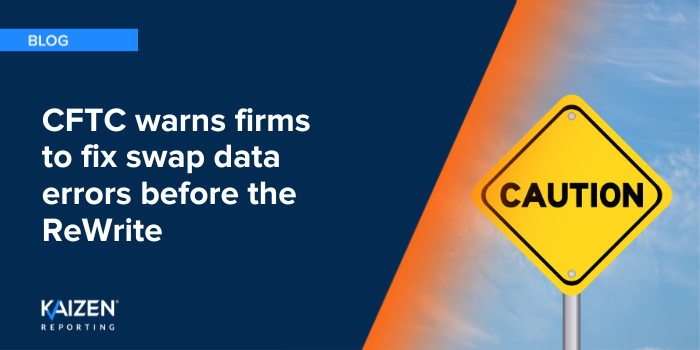CFTC warns firms to fix swap data errors before the ReWrite

With just under six months until the implementation of the CFTC ReWrite, the CFTC’s advisory letter 22-06 (Friday 10 June) is a timely reminder of the upcoming verification, correction and notification requirements. These rules [Part 45.14 – Correcting errors in swap data and verification of swap data accuracy] include obligations for firms to:
- Frequently verify the “completeness and accuracy” of the data held at the Swap Data Repository (SDR)
- Fix any errors they discover “as soon as technologically practicable” following discovery of the error
- Notify the CFTC where they have determined they cannot fix any errors within the maximum 7 days permitted for “timely corrections”.
One element of these rules that is proving contentious amongst the reporting firms is the requirement to verify the errors based on the open trades on the ‘Open Swaps Report’ produced by the SDR but to also fix any dead swaps that are terminated, matured, or otherwise closed within the same seven day time limit as the open swaps. Trying to determine the population of dead trades impacted by the same issue is likely to be challenging in itself. And then submitting the corrections to those dead trades within the seven day period is likely to be very challenging.
Advisory letter 22-06 provides some additional details around how the firms should notify the CFTC (by email) when they determine they will be unable to correct them within the prescribed seven day period from detection of the error.
The advisory goes on to specifically call out an issue that Kaizen Reporting frequently detect in our CFTC Accuracy Testing: Cleared trades remaining as open swaps in the SDR long after the clearing process would have replaced them and swaps that have been terminated but left open in the SDR.
Swaps that erroneously appear in SDRs as open swaps, despite having been terminated, account for a significant number of existing swap data errors that staff have identified. This type of error results in the accumulation of erroneously open swaps at the SDRs over time, which impedes staff’s use of the swap data.
Another aspect that might prove controversial or contentious is the statement that a reporting counterparty may have an obligation to correct errors and terminate trades where the error was reported by another entity such as a clearing house. And by extension of this principle presumably also where the original error was reported by a SEF.
Regulation 45.4 requires reporting swap terminations as an element of continuation data, thereby providing SDRs with the information needed for them to change a swap’s status from open to closed. For example, in the case of cleared swaps, the obligation to report the termination of an original swap at the SDR is on the derivatives clearing organization (DCO). In addition to this continuation data reporting obligation, counterparties to the original swap have an independent obligation to correct errors of this nature.
So a reporting counterparty detects an issue in the ‘swap creation data’ submitted by a DCO and as well as having an obligation to notify the DCO of the error the counterparty might also have an obligation to fix that error themselves. I think more details will be needed from the CFTC for firms to understand these seemingly conflicting obligations and put workable procedures in place around it. It would be good if the CFTC could also confirm whether this principle is applicable to SEF submitted ‘swap creation data’ errors as well, given the example cited was a DCO.
The advisory then reminds firms that the obligation to fix errors dates back to the original 2012 rules, stating that firms have been aware of the upcoming part 45.14 obligations since September 2020 and tells them to get cracking with fixing stuff before the CFTC ReWrite go-live on 5 December.
Accordingly, SEFs, DCMs, and reporting counterparties should review, as early as possible, their open swaps data in order to identify and correct any errors. Correcting outstanding errors in swap data, including swap data for swaps that are no longer open swaps but are maintained by an SDR as if the swaps were still open swaps, in advance of December 5, 2022, may reduce the number of Swap Data Error Correction Notification Forms that SEFs, DCMs, and reporting counterparties will be required to submit to self-report swap data errors.
Kaizen has been advocating precisely this approach for a long time now. Use the time before the ReWrite implementation as a window to find and fix as many errors as possible before you need to start notifying the CFTC of these errors.
So what are you waiting for? Get cracking and fix stuff!
- Read the full press release on the CFTC website.
- For a conversation with Alan or one of our regulatory specialists about the topics mentioned above, please contact us.


